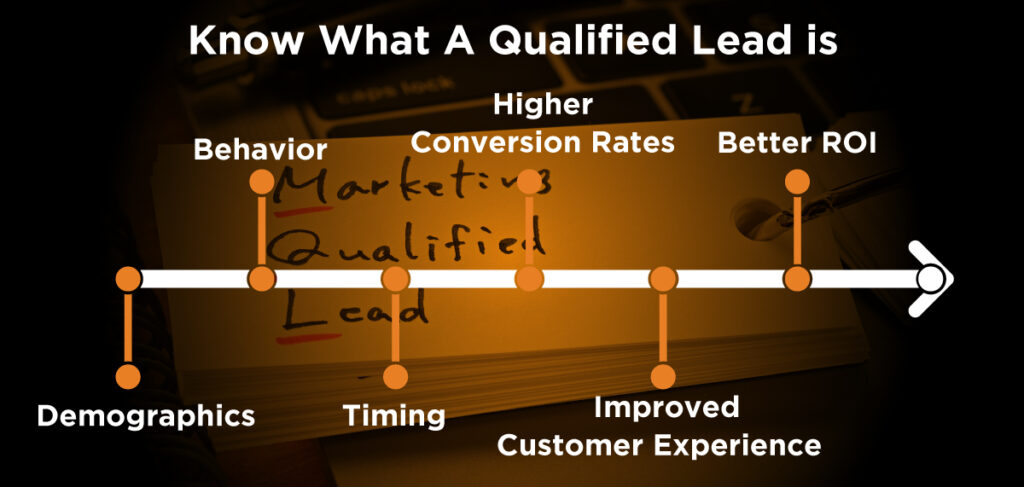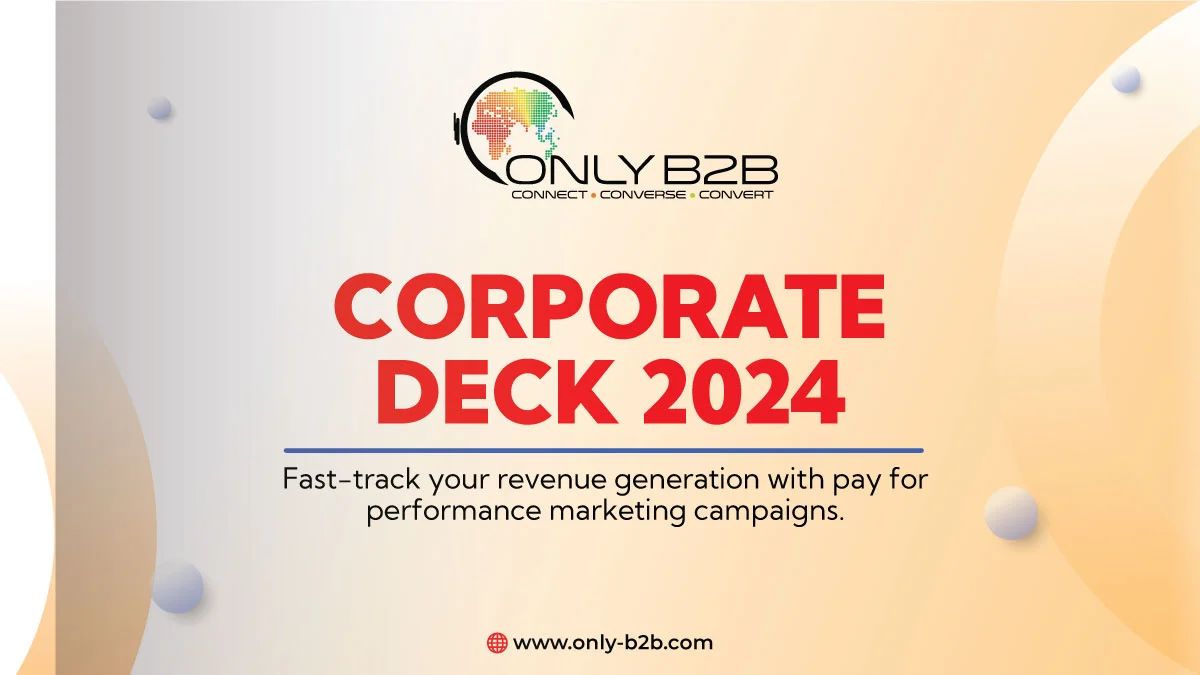
Generating marketing qualified leads is an essential aspect of any B2B marketing strategy. It’s a process that can be challenging but is ultimately rewarding if done correctly.
As a business owner or marketer, you know how important leads are to the success of your business. However, not all leads are created equal. In fact, one of the most critical aspects of lead generation is understanding the difference between a lead and a qualified lead.
Must Read: MQL to SQL conversion rate
Know What A Qualified Lead is
Table of Contents
- 1 Know What A Qualified Lead is
- 2 Now that we understand the basics, lets move on to important ways to generate B2B marketing qualified leads.
- 3 Attend Industry Events
- 3.1 Use Paid Advertising
- 3.2 Offer Free Trials
- 3.3 Monitor and Analyze Your Results
- 3.4 Partner with Other Businesses
- 3.5 Build Effective Unique Value Proposition
- 3.6 Identify your target audience
- 3.7 Identify your unique benefits
- 3.8 Make it clear and concise
- 3.9 Focus on the benefits, not the features
- 3.10 Share this:

A lead is simply someone who has shown some level of interest in your product or service. They may have filled out a form on your website, called your sales team, or even visited your store. However, just because someone has expressed some interest in your business, it doesn’t necessarily mean that they are a good fit or have a high likelihood of becoming a customer. This is where qualified leads come in.
A qualified lead is a lead who meets certain criteria that make them more likely to become a customer. These criteria can vary depending on your business and industry, but some common examples include:
Demographics –
This could include things like age, gender, job title, or location. For example, if you sell a product that is primarily used by women over the age of 35, then a qualified lead would be someone who fits that demographic.
Behavior –
This could include things like how many times they’ve visited your website, what pages they’ve viewed, or whether they’ve interacted with your brand on social media. If someone has shown a high level of engagement with your brand, they are more likely to be a qualified lead.
Timing –
Timing can be an important factor in determining whether a lead is qualified. For example, if someone has recently expressed interest in your product or service, they may be more likely to become a customer than someone who expressed interest months ago.
Budget –
Depending on your product or service, a qualified lead may need to have a certain budget in order to make a purchase. For example, if you sell enterprise software, a qualified lead may be a business that has a budget of at least $50,000 for software purchases.
So why is it important to focus on generating qualified leads rather than just any leads? There are several reasons:
Higher Conversion Rates –
Qualified leads are more likely to become customers because they already meet the criteria for being a good fit for your business. This means that your sales team can focus their efforts on leads that are more likely to convert, leading to higher conversion rates.
Better ROI –
When you focus on generating qualified leads, you can avoid wasting time and resources on leads that are unlikely to become customers. This means that your marketing and sales efforts are more efficient and can provide a better return on investment.
Improved Customer Experience –
When you focus on generating qualified leads, you can provide a better customer experience because you are targeting people who are more likely to be interested in your product or service. This can lead to more satisfied customers and better reviews for your business.
Must Read: Important Ways To Generate Marketing Qualified Leads
Now that we understand the basics, lets move on to important ways to generate B2B marketing qualified leads.
Define Your Ideal Customer Profile
The first step in generating marketing qualified leads is to define your ideal customer profile. This is a description of the type of customer that is most likely to buy your product or service. You need to consider factors such as industry, company size, job title, and pain points. Having a clear understanding of your ideal customer profile will help you create more targeted marketing campaigns that will resonate with your target audience.
Create High-Quality Content
Creating high-quality content is essential for generating marketing qualified leads. Content can come in many forms, including blog posts, whitepapers, eBooks, infographics, and webinars. The key is to create content that provides value to your target audience and addresses their pain points. When your content is informative, engaging, and useful, it will attract potential customers and encourage them to engage with your brand.
Use Social Media
Social media is an excellent tool for generating B2B marketing qualified leads. LinkedIn is particularly useful for B2B marketing, as it is a professional networking platform that allows you to connect with decision-makers in your target industry. You can use LinkedIn to share your content, engage with your audience, and build relationships with potential customers.
Employ Search Engine Optimization (SEO)
SEO is a powerful tool for generating B2B marketing qualified leads. By optimizing your website and content for search engines, you can attract potential customers who are actively searching for products or services like yours. This can help increase your website traffic and generate more leads.
Host Webinars
Webinars are an excellent way to generate marketing qualified leads. They allow you to provide valuable information to your target audience while also giving you the opportunity to showcase your expertise. Webinars also provide an excellent opportunity to engage with potential customers and answer their questions. You can use webinars to generate leads by requiring attendees to provide their contact information in exchange for access to the webinar.
Optimize Your Website
Your website is one of your most valuable marketing assets, and it’s essential to optimize it for lead generation. This means making sure your website is easy to navigate, providing valuable content, and using clear calls to action. You should also make sure your website is mobile-friendly and optimized for search engines so that potential customers can find your site.
Use Email Marketing
Email marketing is an effective way to generate marketing qualified leads. You can use email to promote your content, offer exclusive promotions to subscribers, and provide information about your product or service. When sending marketing emails, it’s important to personalize them and segment your email list based on factors such as job title and industry.
Attend Industry Events
Attending industry events is an excellent way to generate marketing qualified leads. You can use these events to network with potential customers, showcase your products or services, and learn more about your target industry. Make sure to have a clear strategy in place before attending an event, and don’t be afraid to follow up with potential customers after the event.
Use Paid Advertising
Paid advertising can be an effective way to generate marketing qualified leads. You can use platforms like Google Ads and social media advertising to target your ideal customer profile and drive traffic to your website. When using paid advertising, it’s important to create targeted ads that are relevant to your target audience and use clear calls to action.
Offer Free Trials
Offering free trials is an effective way to generate marketing qualified leads. It allows potential customers to try your product or service before committing to a purchase. When offering free trials, it’s important to make sure that they are easy to sign up for and use. You can also use free trials as a way to collect contact information from potential customers.
Monitor and Analyze Your Results
Finally, it’s important to monitor and analyze your results to see what’s working and what’s not. Use analytics tools to track your website traffic, email open rates, and other metrics. Use this information to refine your B2B marketing strategy and generate more qualified leads.
Partner with Other Businesses
Partnering with other businesses can be a powerful way to generate B2B marketing qualified leads. You can work with complementary businesses to offer joint promotions, co-create content, or offer bundled services. This can help you reach a wider audience and generate more leads.
Must Read: Utilizing Intelligent Content Syndication To Produce High Intent MQLs
Build Effective Unique Value Proposition
In today’s fast-paced business world, having a unique value proposition is crucial for any B2B company. A unique value proposition, or UVP, is the statement that clearly communicates the unique benefits your company offers to its customers. It is the foundation of your marketing message and sets you apart from your competitors.
Creating an effective UVP is a critical part of a successful B2B marketing strategy. It helps you to communicate your message more clearly, build brand awareness and loyalty, and ultimately generate more leads and sales. In this blog, we’ll take a closer look at the key elements of an effective UVP and provide some tips on how to create one that sets your company apart from the competition.
Identify your target audience
Before you can create an effective UVP, you need to have a clear understanding of your target audience. Who are they, what do they need, and how can your company help them? Understanding your target audience is the first step in creating a UVP that resonates with them.
Identify your unique benefits
Your UVP should clearly communicate the unique benefits that your company offers to its customers. What sets you apart from your competitors? What value do you bring to the table that no one else does? This could be anything from your superior technology, your exceptional customer service, or your innovative business model.
Make it clear and concise
Your UVP should be clear, concise, and easy to understand. It should be no more than a sentence or two, and should be able to communicate your unique benefits in a way that is easy to understand and remember. Avoid using jargon or complex language that may confuse your target audience.
Focus on the benefits, not the features
Your UVP should focus on the benefits of your product or service, not just the features. Benefits are the positive outcomes that your customers will experience by using your product or service, while features are the specific functions or characteristics of your product or service. By focusing on the benefits, you can communicate the value of your product or service in a way that resonates with your target audience.
Test and refine
Creating an effective UVP takes time and effort. It is important to test your UVP with your target audience to see how it resonates with them. You may need to refine your message based on their feedback, or you may need to change your approach altogether. The key is to be open to feedback and willing to make changes as needed.
Incorporate your UVP into your marketing message
Once you have developed an effective UVP, it is important to incorporate it into your marketing message. This can include your website, your sales materials, your social media profiles, and any other marketing channels you use to reach your target audience. By consistently communicating your UVP across all of your marketing channels, you can build brand awareness and loyalty, and ultimately generate more leads and sales.
A unique value proposition is an essential part of any successful B2B marketing strategy. By clearly communicating the unique benefits your company offers to its customers, you can set yourself apart from the competition and build a loyal customer base. Remember to focus on the benefits, not just the features, and to test and refine your UVP over time. With a clear and concise UVP, you can communicate your message more effectively, generate more leads and sales, and ultimately grow your business.
Conclusion
Generating B2B marketing qualified leads is a crucial part of any successful B2B marketing strategy. By implementing the various tactics and strategies discussed in this blog, you can create a steady stream of high-quality leads that can ultimately turn into loyal customers.
To recap, some of the key ways to generate B2B marketing qualified leads include identifying your target audience, creating compelling content, optimizing your website for lead generation, utilizing social media and other digital marketing channels, leveraging email marketing, and nurturing leads with personalized follow-up.
However, it’s important to remember that lead generation is an ongoing process that requires consistent effort and optimization. By regularly analyzing and refining your lead generation efforts, you can continue to improve your results over time.
Ultimately, by focusing on creating a well-defined UVP, identifying your target audience, and using a mix of targeted tactics and strategies, you can successfully generate high-quality leads that can help drive your business growth and success.
Must Read: How To Become An Expert At Generating MQLs

Vikas Bhatt is the Co-Founder of ONLY B2B, a premium B2B lead generation company that specializes in helping businesses achieve their growth objectives through targeted marketing & sales campaigns. With 10+ years of experience in the industry, Vikas has a deep understanding of the challenges faced by businesses today and has developed a unique approach to lead generation that has helped clients across a range of industries around the globe. As a thought leader in the B2B marketing community, ONLY B2B specializes in demand generation, content syndication, database services and more.


